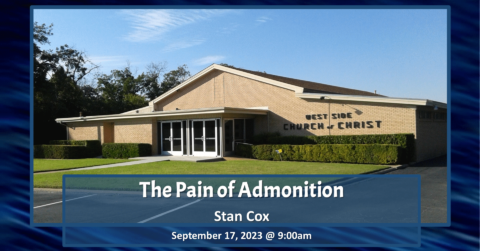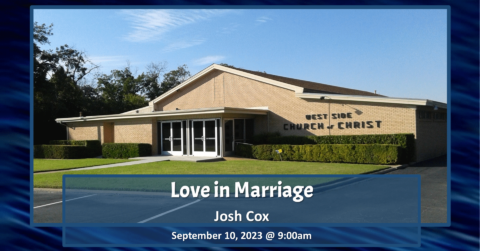Category: Love
Subject: Love
Sermon: The Integrity of Joseph (Genesis 50)

A discussion of Genesis 50, showing what kind of man Joseph was in his response to his brothers’ petitions.
Sermon Powerpoint View and Download:
<<———><><———>>
Demonstrations of Love

There are many examples of love shown in the scripture that help to teach us the proper response to others.
For example, we see numerous examples of a mother’s love for her child. Sarah’s love for Isaac, the son of promise, is found in Genesis 21:6-7,10. Rebekah loved Jacob, Genesis 25:28. Moses’ mother loved him, Exodus 2:1-11, as did the daughter of Pharoah. Many other Old Testament examples could be cited, such as the virtuous woman of Proverbs 31, and Hannah’s love for Samuel in 1 Samuel 1 and 2. The New Testament teaches the same in Mary’s love for Jesus, chronicled on many occasions, and the directions that Paul gave to Titus in Titus 2:4. Continue reading “Demonstrations of Love” →
Five “Golden” Rules

(Adapted from a sermon outline “starter” that appeared on Facebook by Mark Posey on 1/19/24)
Anyone who is familiar with the teaching of Jesus Christ will know what is called the “golden rule.” “Therefore, whatever you want men to do to you, do also to them, for this is the Law and the Prophets” (Matthew 7:12).
The rule encompasses the most important truth for the Christian, and that is the imperative of love. “Love suffers long and is kind; love does not envy; love does not parade itself, is not puffed up; does not behave rudely, does not seek its own, is not provoked, thinks no evil; does not rejoice in iniquity, but rejoices in the truth; bears all things, believes all things, hopes all things, endures all things. Love never fails…” (1 Corinthians 13:4-8). It is not inappropriate to call it the golden rule, though that is a name given it by man, not found in scripture. Continue reading “Five “Golden” Rules” →
Sermon: Repay No One Evil for Evil

As Christians, we are to emulate the goodness and love of Jesus Christ as we interact with enemies, and those who disappoint or use us.
Sermon Powerpoint View and Download:
<<———><><———>>
God is Light, Love, Life

The first epistle of John is a wonderful letter, giving us insight into God and His beneficent Person as it relates to men.
God is Light
For example, John wrote in (1:5), “This is the message which we have learned from Him and declare to you, that God is light and in Him is not darkness at all.” There are many truths impacted by this declaration. First, we rejoice in God’s light, as it is the illumination of eternity! (cf. Revelation 2:23). While hell is described as a horrendous place of eternal darkness (cf. Jude 13), heaven is place of light, without the need of outer illumination.
However, the chief point of John in his epistle is that for us to walk as God would have it (“in the light”, cf. 6), we must have fellowship with God. Or, explained differently, walking in darkness severs our fellowship with God (6).
God is Love
In 1 John 4:8 the apostle also writes, “He who does not love does not know God, for God is love.” Another declaration about God. It helps to establish God’s nature, especially as we read what love is like in Paul’s discourse of 1 Corinthians 13. “Love suffers long and is kind; love does not envy; love does not parade itself, is not puffed up; does not behave rudely, does not seek its own, is not provoked, thinks no evil; does not rejoice in iniquity, but rejoices in the truth; bears all things, believes all things, hopes all things, endures all things. Love never fails.” (13:4-8).
This does such a good job of describing God, but it also indicates the importance of the concept in our faith, and the type of people we are to be! As John put it, our love for God is the litmus test regarding our fellowship with Him. “But whoever keeps His word, truly the love of God is perfected in him. By this we know that we are in Him. He who says he abides in Him ought himself also to walk just as He walked” (1 John 2:4-6).
God is Life
Finally, John wrote, “And we know that the Son of God has come and has given us an understanding, that we may know Him who is true; and we are in Him who is true, in His Son Jesus Christ. This is the true God and eternal life” (1 John 5:20). The Supreme Being in the universe, the One who created us, and all things material, is the One who is from eternity, the One true God. As Jesus wrote, “I am the Alpha and the Omega, the Beginning and the End” says the Lord, “Who is and Who was and Who is to come, the Almighty.” (Revelation 1:8). God is eternal, and so is the Giver of eternal life. We must come to Him to have eternal life!
“Put that on my account”

In his letter to Philemon, the apostle Paul made an appeal to his brother in Christ about an escaped slave, Onesimus, whom Paul had converted. This was a wonderful thing for Onesimus, but it came as a result of his disobedience and treachery toward Philemon. This short missive is not intended to examine the existence of slavery, nor the fact that the Christian Philemon owned at least one.
There had, though been a change. Once, Onesimus had been “unprofitable to” Philemon, and now Paul wrote was “profitable to you and to me” (11). However, Paul was not willing to defraud his brother. By law, Onesimus belonged to Philemon, and Paul wrote, “But without your consent I wanted to do nothing, that your good deed might not be by compulsion, as it were, but voluntary” (14).
As a means of appealing to Philemon, Paul wrote, “But if he has wronged you or owes anything, put that on my account” (18). This is a true case of going above and beyond based on love for another. It is the action of the Lord Himself, who died not for His own sins, but the sins of you and me.
How about you, are you willing to act in such a sacrificial way? It is one thing to say you are willing to help, but quite another to say, “put that on my account.” Typically, this might be something done for our physical families, but what about our brethren?
The Pain of Admonition

Paul the apostle experienced great pain when it was necessary to admonish, as we all should. And yet, he always did what was right for his brethren, no matter the personal discomfort that came to him individually.
Sermon: Love in Marriage

Josh Cox preaches an important lesson describing and defining the imperative of love in the marriage relationship.
1 John 2:9-11

Light contrasted with darkness. This is a concept that John talks about often. A true Christian is “in the light.” This refers to a right relationship with God, who is our illumination. It is the place a Christ is supposed to be. But, any man who claims such a place, and yet shows hatred for others (in this context, another brother in Christ) remains in the darkness rather than the light.
God loves the world (cf. John 3:16). Love must be characteristic of His children, especially love for those in this glorious family. If we love our brother we abide in the light, “and there is no cause for stumbling.” (10) Light illuminates, making the way easy, and directing the paths of the child of God.
However, hatred keeps one from the light. Without light we do not know where we are going. Sightless and yet walking is a dangerous proposition. Physically we can stub an toe. Spiritually we can lose our soul, a far worse possibility.
Love is the answer. Love for one another. Don’t fool yourself!
Mining the Scriptures: 1 John 2:7-8

The idea of walking in Christ is the fundamental premise of the disciple. What is clearly evident is that love is the foundation of that walk. Jesus said, “A new commandment I give to you, that you love one another; as I have loved you, that you also love one another” (John 13:34). This is how the would be “known” as His disciples.
John’s statement that his commandment is not a new commandment indicates that Jesus’ required it from His disciples from the very beginning. John speaks in great detail about the importance of loving one another. He is known as the “apostle of love.” Perhaps this emphasis was because it was so revelatory to him. He and James were at one time called by Jesus the “Sons of Thunder” (Mark 3:17). But John became associated most with the call to love. The command was “old”, or well established.
It was, however, “new” in the sense that Jesus’ call was revolutionary to a world in sin. Never before had “the true light” shined as it was in the hearts and lives of Jesus’ disciples.
Love for the Brethren

In 1 Thessalonians 2, the apostle Paul spoke of his great desire to come to Thessalonica to see the brethren there. But, he was unable as his efforts to visit were delayed time and again. Finally, he wrote in chapter 3:1, “Therefore, when we could no longer endure it, we thought it good to be left in Athens alone, and sent Timothy, our brother and minister of God, and our fellow laborer in the gospel of Christ, to establish you and encourage you concerning your faith.”
Consider the conflict in Paul. He desired greatly to see their faces. They were his “glory and joy” (2:20). He knew of their struggles in the midst of persecution, and was concerned they might be “shaken by these afflictions” (3:3). He had to know of their faith. It would be a devastating thing if they had faltered, and his labor among them to be in vain. And so he sent Timothy to minister to them.
Paul’s love for his brethren is commendable. The fact that it consumed him to such a degree is significant. It serves as a wonderful example for each of us. “Imitate me, just as I also imitate Christ” (1 Corinthians 11:1). Consider John’s words: “By this we know love, because He laid down His life for us. And we also ought to lay down our lives for the brethren. But whoever has this world’s goods, and sees his brother in need, and shuts up his heart from him, how does the love of God abide in him? My little children, let us not love in word or in tongue, but in deed and in truth” (1 John 3:16-18).
Mining the Scriptures: 1 Timothy 1:5-7

In the fourth verse, Paul noted that “fables and endless genealogies” bring disputes and strife. They are to be avoided. In contrast, the intention of God’s commandments are to promote love. The two great commandments are to love God and love your neighbor. God has established this as a primary principle. All that is required from Him leads to these two things. A love for God and for man characterizes the true Christian. So, a keeping of the laws of God leads to love, not strife.
In order to attain the objective of love, out text indicates that our hearts must be pure. The word pure indicates a heart that is clean, free from corruption. This is especially true with regard to motivation. Also needed is a good conscience. In effect, a man who consistently does what he thinks is right, and avoids doing what he thinks is wrong. Finally, it requires a sincere faith. Faith that is genuine. These are the prerequisites of God’s law bringing about love.
Without these we are ineffective, lacking in understanding.
The Response of Faith

The apostle Peter began his second epistle with a proclamation of God’s mercy and grace. With His divine power, He “has given to us all things that pertain to life and godliness.” Further, “by which have been given to us exceedingly great and precious promises.” Because of this, we “may be partakers of the divine nature, having escaped the corruption that is in the world through lust” (1:2-4).
What a wonderful expression of God’s love. He determined to save man from Himself, and sent His Son. It is through Jesus that God has “blessed us with every spiritual blessing in the heavenly places” (Ephesians 1:3). When we have gained so much from Him, the obvious question we should be asking is—how should we respond to His munificence? Continue reading “The Response of Faith” →
“Behold what manner of love”

Love is foundational to our faith as Christians. It is the basis of all we are and all we do. This is so, because “God is love.” “Beloved, let us love one another, for love is of God; and everyone who loves is born of God and knows God. 8 He who does not love does not know God, for God is love” (1 John 4:7-8).
In this we differ from the world. John develops this truth fully in his first epistle. “In this the children of God and the children of the devil are manifest: Whoever does not practice righteousness is not of God, nor is he who does not love his brother. For this is the message that you heard from the beginning, that we should love one another, not as Cain who was of the wicked one and murdered his brother. And why did he murder him? Because his works were evil and his brother’s righteous. Do not marvel, my brethren, if the world hates you. We know that we have passed from death to life, because we love the brethren. He who does not love his brother abides in death. Whoever hates his brother is a murderer, and you know that no murderer has eternal life abiding in him” (1 John 3:10-15). Continue reading ““Behold what manner of love”” →




